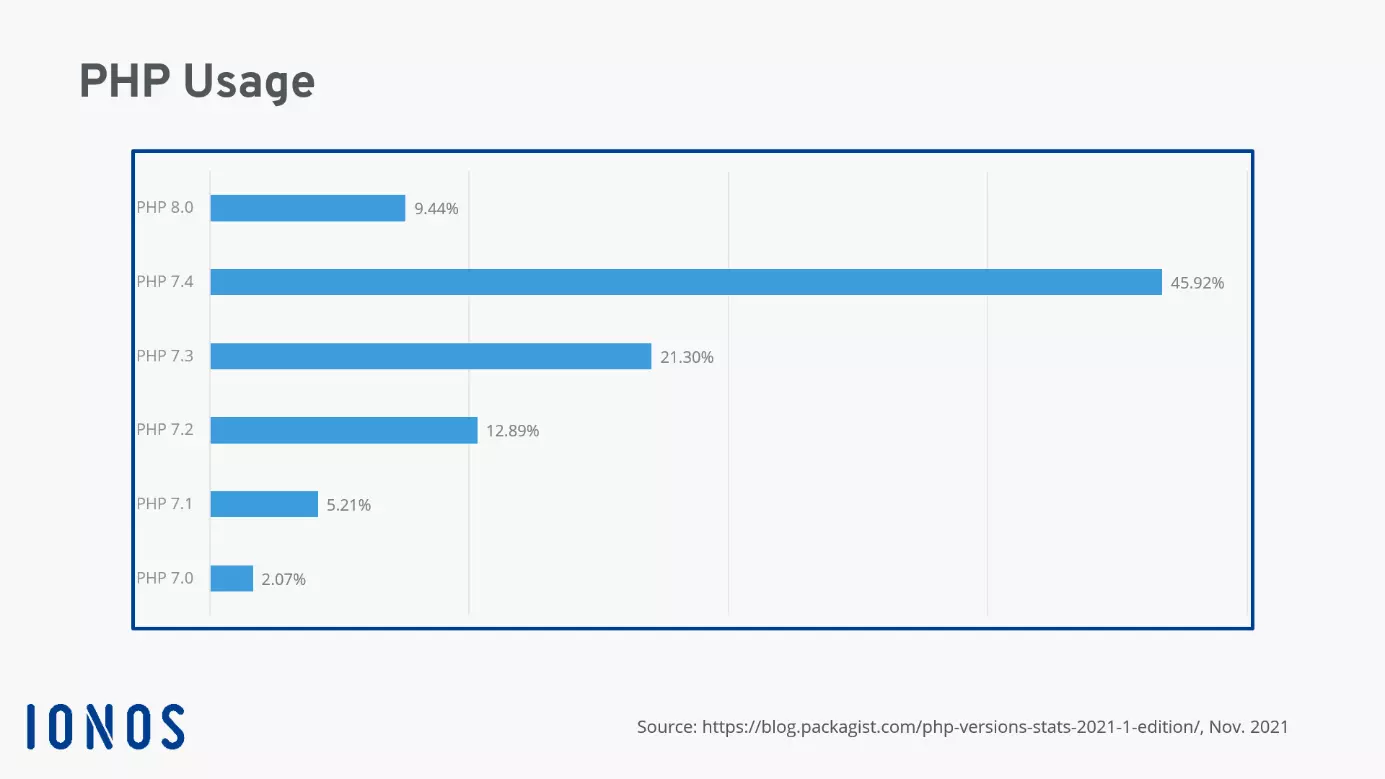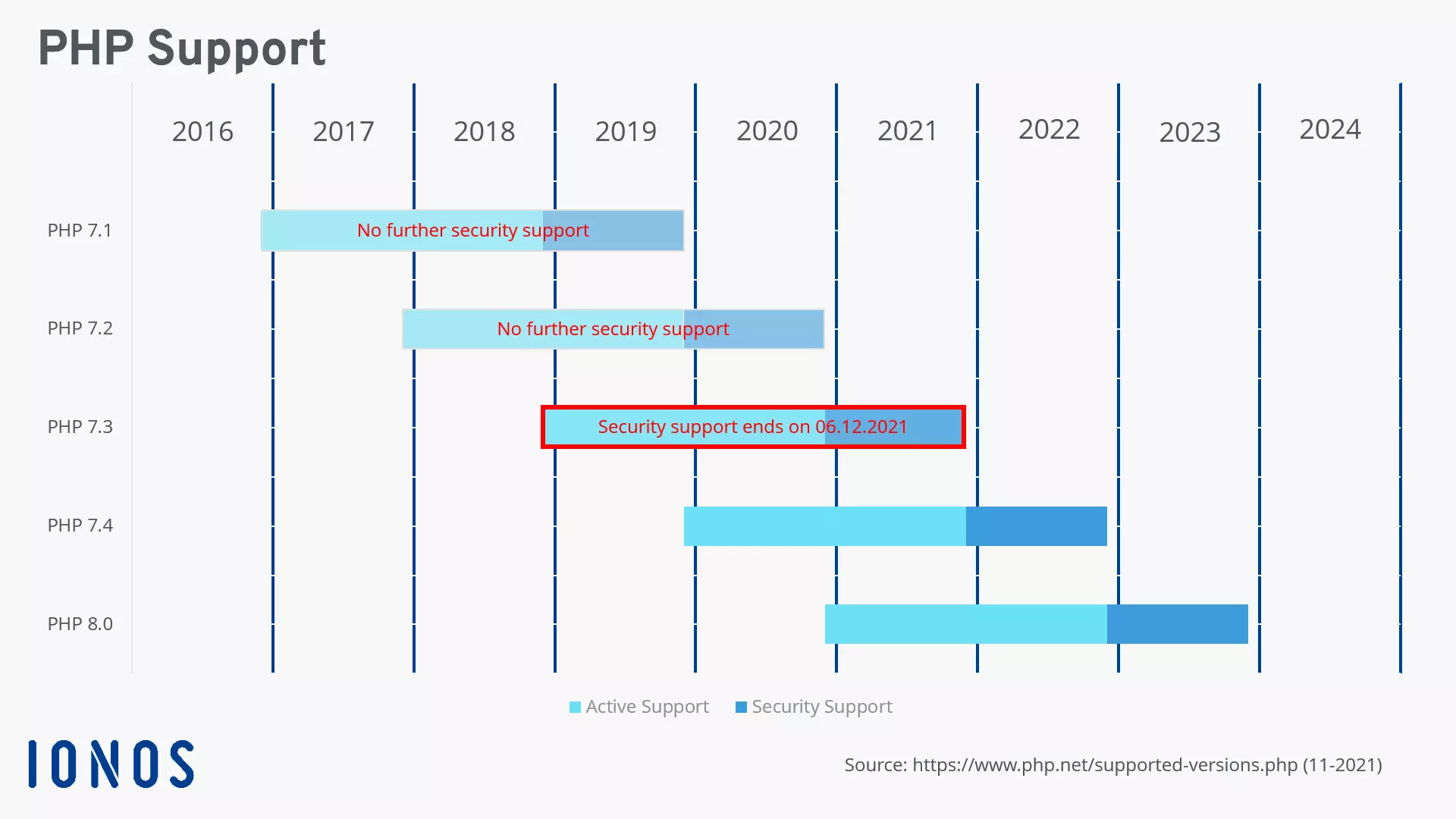PHP 7.3 End-of-life (EOL) in December 2021
As of December 6, 2021, PHP 7.3 will no longer be supported by the PHP community. That’s why you should upgrade to a newer version now. Anyone running PHP 7.3 on their server after the “end-of-life” date will not be protected against new security vulnerabilities. In the worst case this could lead to suddenly inaccessible websites or even data theft. In this article, we explain how PHP 7.3 fits in with past and subsequent versions and how to proceed with upgrading.
- Simple registration
- Premium TLDs at great prices
- 24/7 personal consultant included
- Free privacy protection for eligible domains
PHP – a short version history of the scripting language
Alongside Python and JavaScript, PHP is one of the most popular server-side web programming languages. Popular web platforms such as content management systems WordPress, Joomla! and TYPO3 are built on the language. MediaWiki - the software that powers Wikipedia, the online learning platform Moodle and many other well-known and popular web-based systems are also written in PHP.
Even though the scripting language used to have a somewhat dubious reputation among developers, the PHP basics are easy to learn. Building a website in PHP is quite fun. You learn a lot about how the ubiquitous client-server applications work and what a website is made of.
Don’t have a PHP server yet? Use PHP Hosting from IONOS including PHP Extended Support.
With the release of PHP 7 there was a big leap in development. The release revitalized the community devoted to the programming language. Originally dubbed “PHP next generation” (phpng), PHP 7 optimized performance. The refactoring of the Zend engine had paid off: WordPress-based benchmarks showed almost twice the speed of the previous version 5.6.
Subsequent versions PHP 7.1 and PHP 7.2 delivered improved details. PHP 7.4 is the current and final version of the 7 series. With PHP 8, the next major upgrade was delivered at the end of 2020. Here’s an illustration of the global distribution of the various PHP versions:
The current PHP 8 version extends performance improvements using the modern approach of “Just-in-time compilation” (JIT). JIT also forms the basis of other scripting languages such as Python. However, performance improvements aren’t as drastic as the change from PHP 5.6 to PHP 7.
What exactly is PHP 7.3 End-of-life?
Being an open-source project, PHP is developed by a community of volunteer programmers. Large companies contribute their share; Facebook, for example, has historically contributed a great deal to the development of the language. New versions are developed and released regularly. Every year, around the beginning of December, a new PHP version is released.
Each new release of PHP is actively developed for two years and regularly updated during this time. Subsequently, the version receives security updates for another 12 months. This ensures that newly discovered security vulnerabilities are not immediately exploited to cripple sites and steal data. At the same time, administrators are given plenty of time to prepare their systems for the move to a new PHP version.
Missed the end-of-life for your PHP 7.3 site? Don't worry, with IONOS PHP Extended Support we’ll keep your site up and running.
PHP version 7.3 was released at the end of 2018. Three years on, PHP 7.3 is at the end of its life (“End-of-life”, EOL). As of December 6, 2021, no further security updates will be issued for PHP 7.3. Site operators should switch to PHP 7.4 or 8.x.
Developers may be familiar with the acronym “EOL”. In other contexts, it can refer to the line break character called “end-of-line”.
The table gives an overview of the versions released thus far and their EOL dates, beginning with PHP 7.3:
| PHP version | Released | Active support until | End-of-life (EOL) |
|---|---|---|---|
| 8.0 | 26.11.2020 | 26.11.2022 | 26.11.2023 |
| 7.4 | 28.11.2019 | 28.11.2021 | 28.11.2022 |
| 7.3 | 06.12.2018 | 06.12.2020 | 06.12.2021 |
What to look out for in the PHP 7.3 EOL
PHP forms part of almost every web hosting package. Every provider has their own process for upgrading the PHP installation. Generally, changing the PHP version on the server is possible. However, this can lead to disruptions in the hosted PHP software. Therefore, it’s best to try an upgrade on a staging server.
Find out how to upgrade a PHP version in our IONOS Digital Guide.
In general, most software running on PHP 7.3 is compatible with PHP 7.4 or 8.x. However, it’s important to ensure that the software is up to date. Consider WordPress which requires version 5.3 as a basis for compatibility with PHP 7.4.
Find out how to view or change the PHP version with IONOS in our support guide.
If a PHP software was installed using package manager Composer, you can easily verify whether the software will survive a version swap. To do this, use the Composer command with the --dry-run option, which simulates changes. After logging in via SSH and changing to the root directory of the PHP project, we execute the following commands in succession:
1. Configure Composer to current PHP version (8.0.12 at the time of writing):
composer config platform.php 8.0.122. Check whether the latest versions of the dependencies support the specified PHP version:
composer update --dry-run3. Verify that the current versions of the dependencies support the specified PHP version:
composer update nothing --dry-runUse low-cost webhosting plans from IONOS to host your PHP website.



